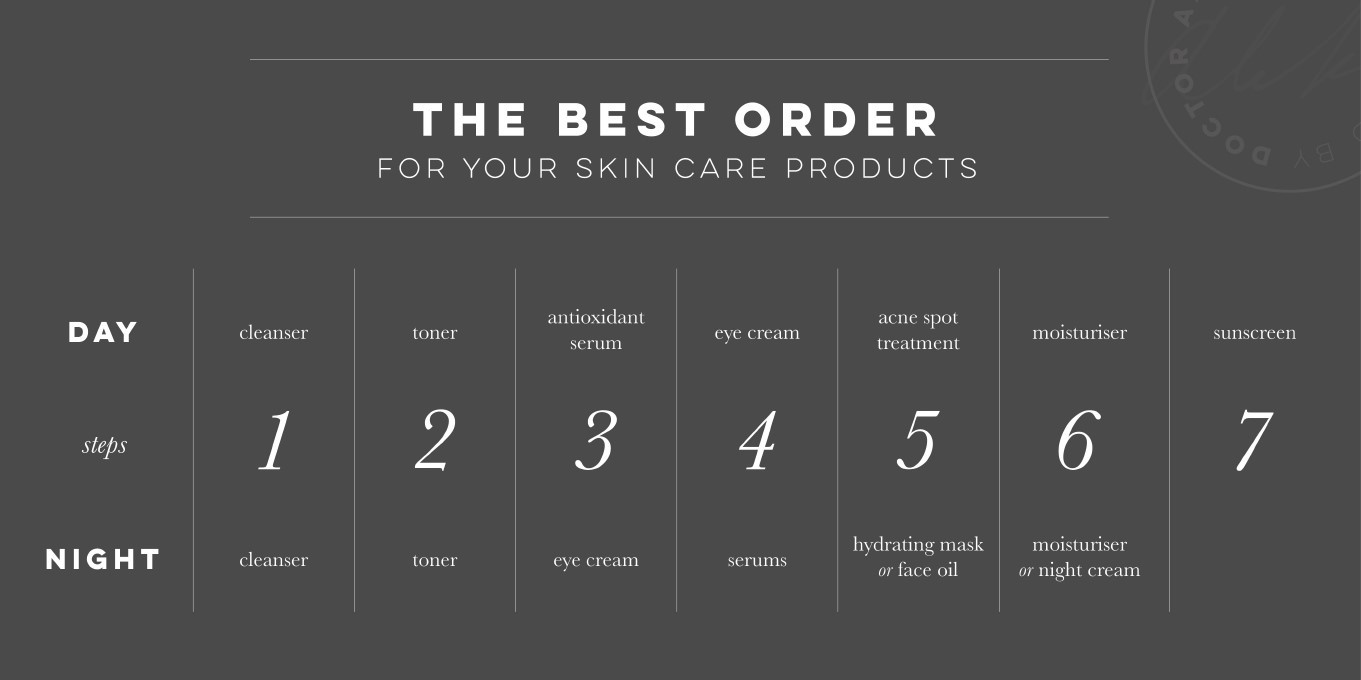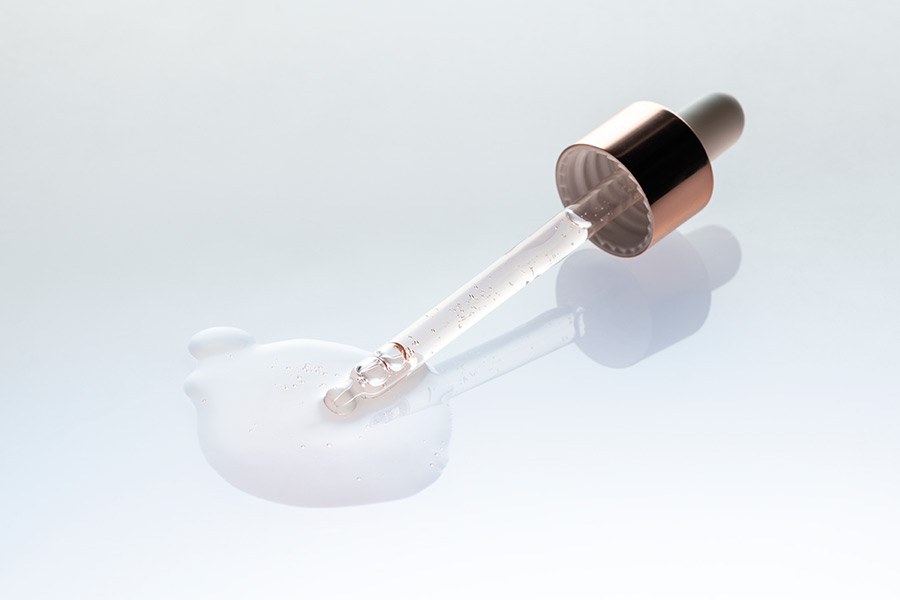I am a firm believer that if you use an everyday morning and night time moisturiser and an effective sunscreen your basic skincare regime is covered. However, by adding an antioxidant serum, you will be taking your preventative and repairing skincare regime to the next level.
Many factors contribute to the ageing process:
- Familial or genetic
- UV damage
- Environmental free radical damage
- Visible light: light wavelengths emitted from monitors, laptops, cell phones, etc.
- Natural ageing changes in the skin, underlying tissue or volume loss and elongation of our facial expression muscles.
What are antioxidants?
Or more specifically what is the function or meaning of antioxidants when applied to the skin:
An antioxidant is an ingredient that when applied topically or to skin slows down or prevents the formation of free radicals or oxidative molecules that are harmful to the skin.
By adding an antioxidant serum, we will be able to target and delay or slow down the onset of genetic ageing, and ageing caused through sun exposure, free radical damage, natural or chronological ageing, and visible light.
Your antioxidant serum represents the 3rd step in your morning skincare regime and the 4th step in your evening regime.

Dr Alek’s Antioxidant tip:
“I recommend to all of my patients, irrespective of their age, to use a daily sunscreen and an antioxidant serum morning and evening.”
My Go To Antioxidants:
There are so many effective topical antioxidants to choose from, and it may become confusing when deciding which product or brand to go with. My approach is to look at clinical studies on each of the ingredients and stick to the ones that have shown their effectiveness. My go-to antioxidants that we should all be using on our skins are vitamin C, vitamin E, vitamin A, niacinamide, ferulic acid and resveratrol. The most straightforward approach would be to divide them into your day time and your evening antioxidants.
Your Morning Regime Antioxidants:
Vitamin C
There are a number of different vitamin C ingredients that are used in antioxidant serums today each with different properties and effectiveness. To name a few: ascorbic acid or L-ascorbic acid, tetrahexyldecyl ascorbate, ascorbyl tetraisopalmitate, etc.
Ascorbic acid is water soluble and in its natural state cannot be absorbed through the outer lipid-rich skin barrier. Formulators have to lower its pH which can cause skin irritations. However, it has been around the longest and has many studies demonstrating its effectiveness.
Tetrahexyldecyl ascorbate is typically used in lower concentrations as it is lipid soluble than ascorbic acid and is less likely to cause skin sensitivity reactions. It is a derivative of ascorbic acid and is considered to be more stable. It is also thought to have anti-inflammatory and hydrating effects for the skin and can penetrate through all the layers of the skin.
Ascorbyl tetraisopalmitate similar to TA is an oil-soluble or lipid-soluble tetra ester derivative of vitamin C and in its natural state is easily absorbed through the skin barrier. It is a highly stable form of vitamin C with potent antioxidant effects. It can stimulate collagen production, reduce fine lines and wrinkles, improve skin hydration and is less likely to cause skin sensitivity reactions when compared to ascorbic acid.
Vitamin C Skin Benefits:
- It acts as a powerful antioxidant preventing environmental or free radical damage and reduces the damaging effects of visible light.
- Helps to lighten or reduce hyperpigmentation.
- Helps prevent ageing and slows the ageing process down.
- Protects against sun damage and boosts your sunscreens SPF.
- Stimulates collagen production which in turns thickens skin and gives it a younger appearance.
Vitamin E
Vitamin E (often listed as tocopherol, tocopheryl acetate, or tocotrienols) is one of the most well-known and most researched antioxidants. It is a fat-soluble vitamin available in both natural and synthetic forms.
Vitamin E Skin Benefits:
- Vitamin E works in several diverse ways to protect cell membranes from oxidative damage and from the initial stages of ultraviolet light damage.
- It also works in synergy with vitamin C to prevent free radical damage.
- It also helps to condition the skin and improve the skin barrier function.
Niacinamide
Niacinamide also known as vitamin B3 and nicotinic acid has multiple benefits for the skin. Not only does it act as an antioxidant, but it will also help to restore and soothe the skin.
Niacinamide Skin Benefits:
- Antioxidant
- Reduces and lightens the appearance of hyperpigmentation.
- Improves skin elasticity.
- Maintains and repairs the skin barrier function.
- Improves tone and texture.
Ferulic Acid
Ferulic acid is a naturally occurring ingredient found in plants and has been extensively researched for its health benefits including its antioxidant and anti-inflammatory effects. A newer derivative from ferulic acid is ferulic acid ester (or ethyl ferulate), and both of these ingredients have been used in topical skin care products. Recent studies have shown that ferulic acid has stronger antioxidant free radical effects while ethyl ferulate has both antioxidant but exhibits stronger anti-inflammatory effects on the skin.
Dr Alek’s Antioxidant tip:
“It is best to start with antioxidants as early as possible. If you are in your twenties or thirties, your first choice should be a sunscreen and your second choice should be an antioxidant serum.”
Your Evening Regime Antioxidants:
Vitamin A
There are numerous vitamin A ingredient derivatives that are used in skin care products:
- Tretinoin (Retin A)
- Retinol
- Retinyl Propionate (retinol ester)
- Retinyl Retinoate
- Retinyl Palmitate
- Retinal (retinaldehyde)
- Hydroxypinacolone Retinoate (HPR)
The most common ingredients found in skincare today are retinol and tretinoin. Unfortunately, these ingredients have shown the propensity to produce unwanted sin reactions such as retinol dermatitis, red and/or flaky skin, desquamation and peeling, irritation and sensitivity, and even itchiness or pruritis.
These reactions are caused predominantly by the conversion process to retinoic acid that takes place in the skin. Newer generation vitamin A derivatives such as hydroxypinacolone retinoate that are retinoic acid esters can bind directly to the retinoic acid receptors thereby eliminating the need for the conversion process. This ultimately leads to less sensitivity and reduces the chances of skin reactions.
Vitamin A Skin Benefits:
- Antioxidant
- A lightening of hyperpigmentation.
- Reduction of pore numbers and pore size.
- Improving the texture of the skin.
- Providing a youthful glow.
- Increased collagen and elastin production.
- A reduction of fine lines and wrinkles.
- Reducing sebum production.
- Improving acne breakouts and blemishes.
- Increasing hydration and a plumping effect of the skin.
Resveratrol
Resveratrol is a potent polyphenolic antioxidant that’s found in red grapes, red wine, nuts, and fruits such as blueberries and cranberries. It is a stable effective antioxidant with numerous skin benefits and is worth adding to your night time skincare regime especially if you are sensitive to vitamin A or one of its derivatives.
Resveratrol Skin Benefits:
- Antioxidant
- It protects against sun damage
- Improves collagen production and reduces cell damage
- It also has significant anti-inflammatory properties.
- In addition, studies have shown that resveratrol inhibits tumour development.
For a more detailed assessment and recommendation of which antioxidant you should be using for your skin type and skin concerns, please complete the Face2Face Skin Assessment or contact our Skin Advice Line at (021) 797 0960 and speak to Samantha or Vashnee.
There are multiple other beneficial antioxidants that I have not mentioned in the above article however the ones I have discussed are all definitely worth adding to your skincare regime. Ultimately the best approach is to choose antioxidant serums that contain a combination of antioxidant ingredients that will work synergistically to protect, repair and prevent further damage and ageing skin changes.
Yours in skin
Dr Alek Nikolic
Antioxidant Meaning:
There are various similar meanings for the word antioxidant:
- Merriam Webster: A substance (such as beta-carotene or vitamin C) that inhibits oxidation or reactions promoted by oxygen, peroxides, or free radicals.
- Medicine Net: A substance that reduces damage due to oxygen, such as that caused by free radicals. Well-known antioxidants include enzymes and other substances, such as vitamin C, vitamin E, and beta carotene, which are capable of counteracting the damaging effects of oxidation.
- Cambridge Dictionary: A substance that slows down the rate at which something decays because of oxidization.
- Oxford Dictionary: A substance such as vitamin C or E that removes potentially damaging oxidizing agents in a living organism.




